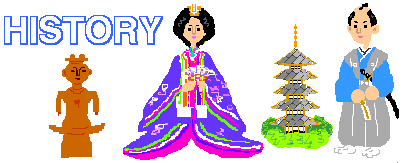

(I am giving a brief history of early Japan. Japan's full history is quite extensive. Please go to the links at the bottom of this page if you want to learn more about Japan's history.)
Historians know very little about the earliest days of Japan.
According to legend, Jimmy Tenno, a descendant of the sun goddess, became the first emperor of Japan in 660 B.C.

The origins of the Japanese remain a mystery. Scientists know that the people who hunted, fished, and gathered plant foods lived on the islands at least 6,500 years ago.
The Japanese borrowed the Chinese system of writing and adopted their advanced methods of calculating the calendar. Confucianism was introduced from China and began to spread across Japan. About 552, Buddhism came to the country from China and Korea.

In 794, the Japanese capital was established at Heian, later called Kyoto. Shortly after completion of the capital, the form of government adopted from China began to weaken. In 858, the emperor and his court fell under the control of the Fujiwaras, a powerful noble family.
The Fujiwaras gained power over the emperor and the court nobility by intermarrying with the imperial family. In addition, the Fujiwaras, as well as other aristocratic families, got control of much of the countryside by establishing great private estates. The Fujiwara family ruled Japan for about 300 years. during this time, the emperors lost all real power, though they still officially reigned.
Links: This is really for older students, and parents.
Imperialism
Meiji period